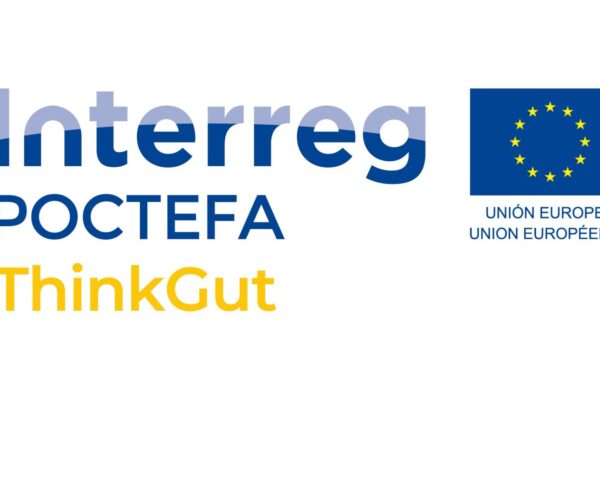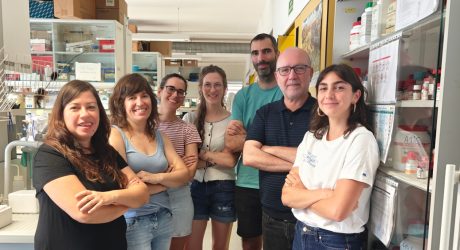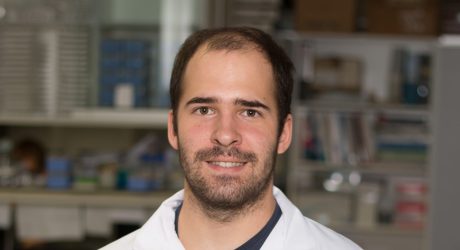A cross-border consortium, coordinated by IDIBGI, receives european funding to study the role of the gut microbiota in neurocognitive disorders associated with obesity and aging
The research project “Personalized prediction of cognition through the human microbiota” (THINKGUT) has been co-funded by the European Regional Development Fund (ERDF) through the POCTEFA program.
Girona Biomedical Research Institute (IDIBGI) coordinates THINKGUT, with the participation of the French partners Institut National de la Santé Et de la Recherche Médicale (INSERM) and the SME Enterosys SAS. The aim of the project is to develop personalized diagnostic and therapeutic tools focused on preventing, diagnosing and treating neurocognitive disorders associated with obesity and aging. See press release here.
The prevalence of neurodegenerative disorders is among the greatest current threats related to aging in the European Union. There is evidence that obesity affects neurocognitive dysfunction and also the composition of the gut microbiota. Moreover, the gut microbiota is also an important and poorly recognized element in neurocognitive dysfunction in elderly subjects.
THINKGUT will establish a cross-border consortium of experts in microbiota and cognition, with exploratory tools and data from 1.700 human subjects. Bioinformatic and biomathematical models will be used to identify those bacterial species and their metabolites which interact with the intestinal microbiota-liver-brain axis, and its impact on neurocognitive decline. Functional analysis will be performed in mice colonized with gut microbiota from different patient groups, in which neurocognitive dysfunction will be extensively studied after fecal transplantation. It is foreseen that the results will help to build tools to predict and prevent diseases associated with the axis gut-liver-brain microbiota.
THINKGUT is coordinated by IDIBGI through Dr. José Manuel Fernández-Real, head of the Nutrition, Eumetabolism and health research group and researcher at the CIBEROBN Pathophysiology of Obesity and Nutrition (Instituto de Salud Carlos III). Dr. Josep Puig from the same centre will also collaborate in the project. On behalf of INSERM, the project will be led by Dr. Rémy Burcelin and from Enterosys SAS side, the leadership will be in charge of Dr. Maxime Fontanié.
The project has a total budget of 1.3 M€ and has been co-funded at 65% by the European Regional Development Fund (ERDF) through the Interreg V-A Spain-France-Andorra Program (POCTEFA 2014-2020). The objective of POCTEFA is to reinforce the economic and social integration of the Spain-France-Andorra border area. Its help focuses on the development of cross-border economic, social and environmental activities through joint strategies in favour of sustainable territorial development. Cross-border cooperation is crucial to obtain information and compile cohorts from clinical centres in the POCTEFA territory in a repository, allowing the development of therapies and drugs for the prevention of obesity, metabolic diseases and the neurocognitive deterioration of aging.
El proyecto Thinkgut ha sido cofinanciado al 65% por el Fondo Europeo de Desarrollo Regional (FEDER) a través del Programa Interreg V-A España-Francia-Andorra (POCTEFA 2014-2020). El objetivo del POCTEFA es reforzar la integración económica y social de la zona fronteriza España-Francia-Andorra. Su ayuda se concentra en el desarrollo de actividades económicas, sociales y medioambientales transfronterizas a través de estrategias conjuntas a favor del desarrollo territorial sostenible.
Le projet a été cofinancé à hauteur de 65% par le Fonds Européen de Développement Régional (FEDER) au travers du Programme Interreg V-A Espagne-France-Andorre (POCTEFA 2014-2020). L’objectif du POCTEFA est de renforcer l’intégration économique et sociale de l’espace frontalier Espagne-France-Andorre. Son aide est concentrée sur le développement d’activités économiques, sociales et environnementales transfrontalières au travers de stratégies conjointes qui favorisent le développement durable du territoire.




